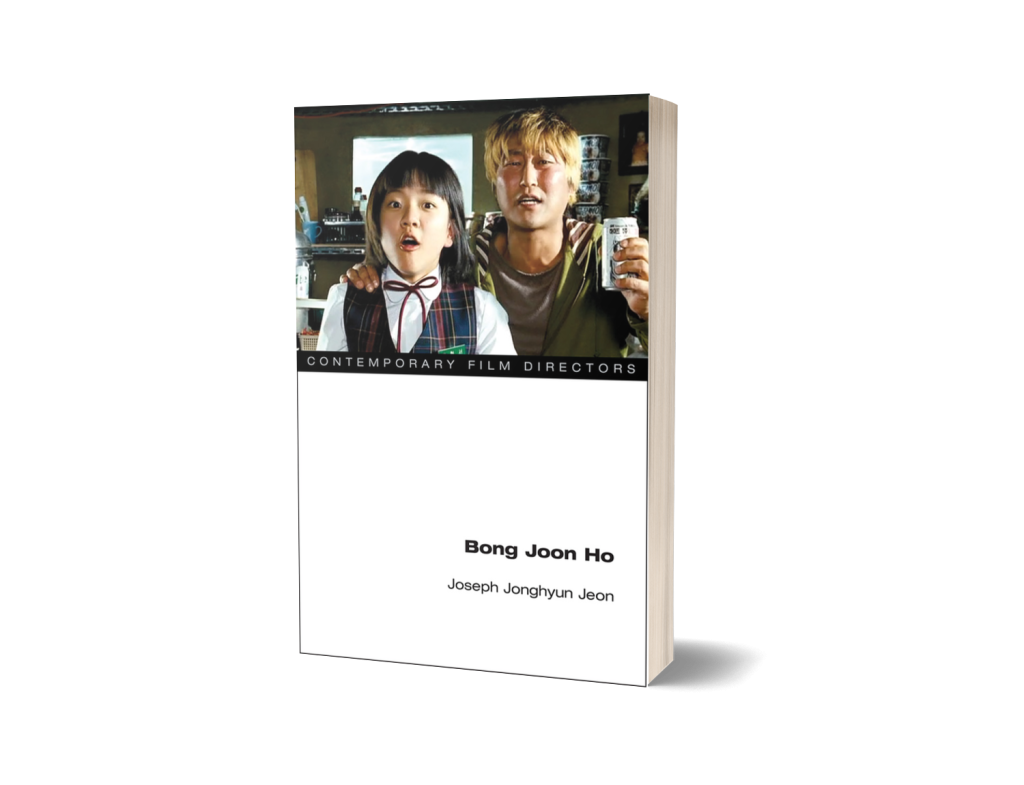Joseph Jonghyun Jeon, author of Bong Joon Ho, answers questions on his new book.
Q: Why did you decide to write this book???
This was a decision long in the making. The first Bong Joon Ho film I ever saw happened to be Memories of Murder (Sarin?i Ch’u?k, 2003) at its US premiere at the San Diego Asian Film Festival, for which I was a juror that year. Several years later, I published an article on the film in what was then called Cinema Journal. It wasn’t until 2018 at a film and media conference in Toronto, however, when the editors of the Contemporary Film Directors series on the University of Illinois Press invited me to write this book that I thought to do it all. At the time, I felt that it was not yet the right time. I wanted to see a fuller arc in the director’s career. Just a year later (much earlier than I expected), Parasite (Kisaengch’ung, 2019) became a sensation, winning the Palme d’Or at the Cannes Film Festival and Best Picture at the Oscars, and I wrote the editors telling them that the time had come.
Q: What is the most interesting discovery you made while researching and writing your book???
The detail that leaps to mind came from Bong Joon Ho himself during the interview I conducted with him in 2020. The interview appears in the book. At the time, I had completed an early draft of the manuscript, but I was still actively thinking and working. He told me about his desire, and the desire of film directors in general, to control in filmmaking natural elements like fire, wind, and rain. Specifically, he spoke about his interest in capturing the dynamic movements of water on film. I suddenly realized just how much water in its various forms play a central role in the mise-en-scène of his films. And while his films are deeply sociological in their interests, he often accesses his most important social insights by thematizing more fundamental relations, like the interactions of his characters with natural phenomena.
Q: What myths do you hope your book will dispel or what do you hope your book will help readers unlearn??
From early in his career, Bong Joon Ho has been described as ingenious for his creative engagements with genre. He is frequently described as a genre-bender. While this notion is not untrue in the sense that many of his films push at the limits of familiar film genres, I do not think that the desire to upset genre expectations is primary for Bong. Rather, the contradictions and paradoxes that we frequently see thematized in his films, which sometimes take the form of genre-bending moments, emerge from more fundamental social and historical contradictions that stem from Korea’s vexed placement within a complicated and rapidly changing geopolitical environment at the turn of the 21st century. Shifting genres in this context reflect in other words more fundamental political and economic shifts that register powerfully in Korea because of its position with respect to more powerful global and regional powers at a time of profound and rapid historical change.
Q: Which part of the publishing process did you find the most interesting???
The experience of writing this book was quite different than it was for previous books. Most significantly, I wrote this book (relatively speaking) somewhat quickly, with most of the writing taking place over the course of a single year. For this reason, the reader reports were a lifeline for me, including the report I received from the series editors. When you are writing on a constrained timeline, it is difficult to see the project from the outside. So, the reader reports were a crucial opportunity to assess how effectively the manuscript was communicating what I thought I wanted to express. I most appreciate reader reports that take you in surprising directions, and these reports very much did that for me. I am super grateful.
Q: What is your advice to scholars/authors who want to take on a similar project??
My answer here is directed to scholars/authors who are interested in writing for the Contemporary Film Directors Series or something similar. The most challenging part of writing this book was balancing a responsibility to Bong Joon Ho’s body of work in general with my own critical investments. In taking on a project like this, the critical apparatus of the book is in some ways a given, organized as it is by a single director, rather than a critical issue or a range of related problems (as in the case of my previous books). On the other hand, it is imperative to offer a distinct critical perspective that guides one’s interpretations. I am happy with the balance I found in writing this book, but I would encourage scholars/authors interested in taking on a similar project think about how they would accomplish this balance in their case.
Q: What do you like to read/watch/or listen to for fun??
My tastes are eclectic, and I am fortunate enough to be at a point in my academic career at which what I read/watch/listen to for fun is often also what I want to teach and examine in writing. Lately, I have been really interested in films coming out of Southeast Asia, especially some recent Thai films, which remind me of Korean films from a few decades ago for their interest in tracking the dizzying transitions propelled by what is sometimes termed “compressed modernity.” Two that come to mind are Bad Genius (2017) and Hunger (2023), both of which star the amazing Thai actress, Chutimon Chuengcharoensukying (aka Aokbab).
Joseph Jonghyun Jeon is a professor of English at the University of California, Irvine. He is the author of Vicious Circuits: Korea’s IMF Cinema and the End of the American Century.

